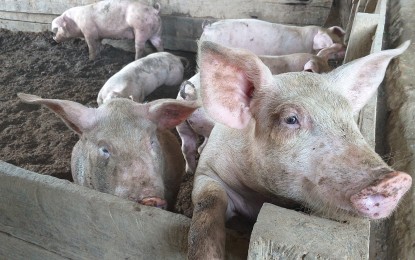
SWINE FEVER. Pigs being raised by an organization in Leyte in this undated photo. Three more towns in Leyte province are included in the list of areas with confirmed African swine fever cases, the Department of Agriculture reported on Friday (Feb. 5, 2021). (PNA file photo)
TACLOBAN CITY – Three more towns in Leyte province are now included in the list of areas with confirmed African swine fever (ASF) cases, the Department of Agriculture (DA) reported on Friday.
DA Regional Executive Director Angel Enriquez said in a virtual press briefing that some hogs in the towns of Tanauan, Palo, and MacArthur have been infected with ASF.
The ASF virus was reported in the villages of Bislig in Tanauan, Kauswagan, and Liwayway in MacArthur, and Baras in Palo town.
Earlier, cases were detected in the towns of Abuyog, La Paz, Javier, and Dulag prompting local authorities to cull at least 1,882 hogs in the past three weeks, Enriquez said.
“To prevent the further spread of ASF virus, we have been asking local governments to implement strict border control, ensuring that no live hogs will be transported by land or by sea,” Enriquez told reporters.
Leyte is the first province in the Visayas that recorded confirmed ASF infection. The first case was recorded on Jan. 14 in Abuyog town.
Governor Leopoldo Dominico Petilla said the province is eyeing to establish safe zones where raisers can continue their hog production despite the presence of the virus.
These safe zones, the governor said will be set up in communal farms far from residential areas.
ASF-hit piggeries in the province are mostly owned by backyard hog raisers.
One of the possible safe zones for hog raising is the 130 farmer associations listed as recipients of the Leyte Economic Program of the provincial government.
He also suggested intensifying the bio-security hazard in piggery to prevent the transmission of the ASF virus.
“We will have more veterinarians in the municipalities and provincial level to train more hog raisers on how they can protect their pigs against the virus,” Petilla said.
Initial investigation showed that the ASF virus could have been transmitted to local farms in Leyte through infected boar being used for natural mating and by hog traders who may have fed their stocks with contaminated food products.
Pigs affected by ASF usually manifest high fever, distinct reddish areas on the skin of the neck, chest, and extremities, plus bleeding of internal organs that could lead to death within two to 10 days. (PNA)
